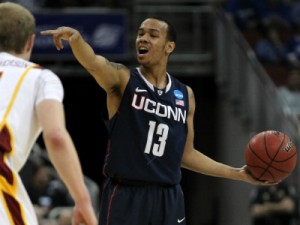NCAA Teams Need Grades Off the Court
The University of Connecticut men’s basketball team won the NCAA championship last year, but was knocked out of the tournament on Thursday in its first game. The Huskies won’t have a chance to play in next year’s tournament, unless they win an appeal, because their academic performance has been deemed sub-par.
The “Big Dance” won’t be the same without UConn, which also won the national title in 2004 and 1999. This year’s tournament has been impacted by school work as well, with Syracuse University losing freshman center Fab Melo on the eve of its first game. He was deemed ineligible for academic reasons, putting a dent in the Orange’s championship hopes.
Players have faced academic suspensions for years, but the move to sanction entire teams is relatively new. HBCUs have been disproportionately affected. They represent about 7 percent of the schools evaluated in the NCAA’s annual report on Academic Progress Rates (APRs), but received 29 of the 58 harshest penalties last year.
There’s actually some good news this year: According to an annual report by the Institute for Diversity and Ethics in Sports (TIDES), the disparity between graduation rates of black and white players in the men’s tournament has narrowed. The difference remains troubling — 88 percent for white players and 60 percent for black players. But the latter group’s number rose by one point while the other number fell by three points.
 Follow
Follow

